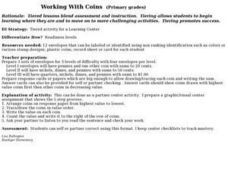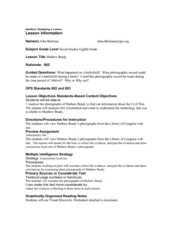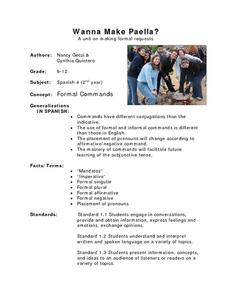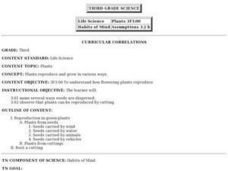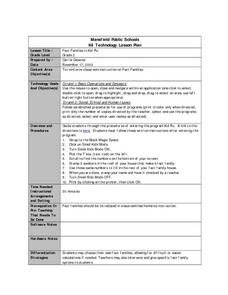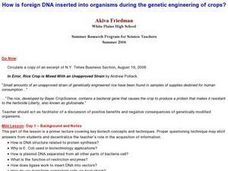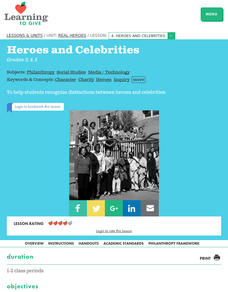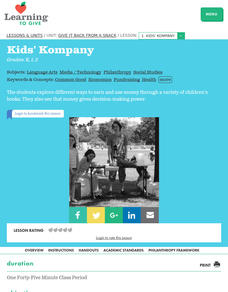Curated OER
Multivariable Calculus: Bonus Quiz 6
In this gradient operator and gradient fields worksheet, students determine if two vectors are gradient fields. They solve for the appropriate scalar functions of a vector variable. Students show that the gravitation al force exerted on...
Curated OER
Multivariable Calculus/ Bonus Quiz 4, Partial Derivatives
In this math worksheet, students practice solving the problems that focus upon the concept of partial derivatives. The problems are in the form of a quiz.
Curated OER
Activity Plan 5-6: What's In a Name?
Students use family names to gather and analyze data. For this counting lesson, students use graph paper to help organize their data and then, in a staircase fashion, organize the names from longest to shortest so they can answer...
Curated OER
What's the Problem? Exploring Conflict in "On the Sidewalk Bleeding"
Young scholars use the story 'On the Sidewalk Bleeding' to analyze the various conflict types found in literature. In this conflict lesson, students view a PowerPoint about the story and identify the four types of conflict. Young...
Curated OER
Working With Coins
Students arrange coins based on their value. In this coins lesson plan, students trace and record the value of each coin. Students count up to find the total value of all the coins.
Curated OER
Civil War
Students explore the Civil War. In this U.S. Civil War U.S. history lesson, students participate in a cubing activity in which a variety of Civil War projects are described on a paper cube. Students roll the cube to determine which...
Curated OER
Mathew Brady: Civil War
Eighth graders interpret historical evidence presented in primary resources. In this Civil War lesson, students analyze photographs taken by Mathew Brady.
Curated OER
George and Sam Save for a Present
Third graders develop their algebraic thinking by recognizing a variety of patterns using concrete objects, numbers, tables, and pictures. In this George and Sam Save for a present lesson, 3rd graders communicate their mathematical...
Curated OER
The Life and Times of Tomie dePaola
First graders research information about the author Tomie dePaola. In this author studies instructional activity, 1st graders use the computer to find information about Tomie dePaola's life and writing accomplishments. Students create...
Curated OER
Making Formal Requests
High schoolers investigate the concept of making formal requests and examples are included in the lesson for teacher presentation. They practice using the phrases in a variety of situations and then make presentations for others to hear.
Curated OER
Plants Reproduce and Grow in Various Ways
Third graders take a walk around the outside of the school and examine their clothing to see if they picked up any seeds while on their walk. They discuss how seeds travel and how a new plant thus can form. They then observe root...
Curated OER
Meteorology -- Clouds
Fourth graders examine the processes of condensation and evaporation. They identify the three types of clouds and state the weather that is possible with each type of cloud. They ask questions to end the activity.
Curated OER
Sound
Second graders study how sound is produced by vibrations and is transmitted through matter in all directions. They observe how sounds are produced and identify the ways in which sound travels.
Curated OER
Fact Families in Kid Pix
Second graders study Fact Families in Kid Pix. They use the mouse to open, close and navigate within this application. They assess one click to select, double click to open, drag to highlight, drag and drop, drag to select an area, use...
Curated OER
Four Corners Spelling
Second graders participate in a spelling activity using clapping and rhythmic patterns. In this ongoing spelling lesson, 2nd graders practice various spelling words in groups and using rhythms. Students then independently spell words.
Curated OER
ETHICAL USE OF THE INTERNET
High schoolers investigate the use of the internet and how it should be used by students. The concepts of intellectual property and fair usage are covered. The author of resources is found by them through practice with finding small...
Curated OER
Careers In Agriscience
Learners investigate careers in Agriscience. They participate in various activities to stay engaged in the lesson. Students also research different careers that are available in the field. Then they answer questions about a career of...
Curated OER
How is Foreign DNA Inserted into Organisms During the Genetic Engineering of Crops?
Students examine the positive benefits and negative consequences of genetically modified organisms following a lecture covering key biotech concepts and techniques. Students then conduct and experiment comparing the travel rate of...
Curated OER
About The Author Lesson 4
Fourth graders engage in a lesson that continues the creation of a specialized Microsoft Word document. They practice creating art using Wordart and inserting images into the document with a paragraph attached. One of the main skills is...
Curated OER
Fact and Opinion
In this writing activity, students identify and describe the difference between a fact and an opinion. They place the cut-up words from the house ad in the correct column to indicate if they are fact or opinion.
Curated OER
Hereos and Celebrities
Students complete a vocabulary game using new words. They use a Venn diagram to distinguish between a celebrity and a hero. They take a vocabulary quiz to complete the lesson.
Curated OER
What is Sensitivity?
Students examine the difference between internal and external differences in people. They identify prejudices in society and explain how important it is to be sensistive to others. They discover types of sensitivity in "To Kill A...
Curated OER
Give It Back From a Snack Lesson 1: Kids' Kompany
Students examine the ways to earn money and discover the different uses for money. They read children's literature and draw pictures of uses for money that benefit the common good.
Curated OER
Heritage: What Would You Take?
Fifth graders explore their own definitions of valuable, and decide what they would choose to take with them if they could only take one item. They define the reasons their items are valuable to them.






